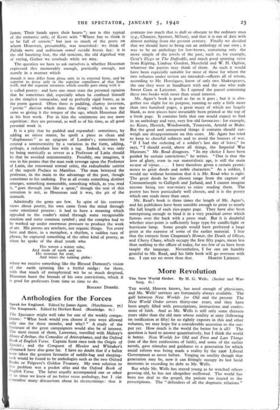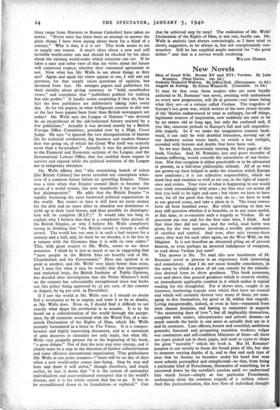More Revolution
Tint world, Heaven knows, has need enough of physicians, and Mr. Wells' services are fortunately always available. The gulf between New Worlds for Old and the present The New World Order covers thirty-one years, and they have been amply filled with prescriptions, instructions and confes- sions of faith. And as Mr. Wells is still only some thirteen years older than the old men whose senility at sixty (following on ossification at fifty) he so rightly exposes in this and other volumes, we may hope for a considerable accession to the out- put yet. How much is the world the better for it all? The question is hard to answer quantitatively, but I think the world is better. New Worlds for Old and First and Last Things (one of the first confessions of faith), and some of the earlier
novels, gave stimulus and guidance to a generation for which social reform was being made a reality by the 1906 Liberal Government as never before. Verging on senility though that generation may be, now it can fittingly occupy its last lucid moments in recording its debt to Mr. Wells.
But while Mr. Wells has stayed young as he watched others • growing old, he has not altogether mellowed. The world has been too deaf to the gospel, the patient too inured to the prescriptions. The " defenders of all the dogmatic religions " (they range from Marxists to Roman Catholics) have taken no notice. "Never once has there been an attempt to answer the plain things I have been saying about them for a third of a century." Why is that, if it is so? This book seems to me to supply one reason. A man's ideas about a new and still invisible world-order can and should be checked by his ideas about the existing world-order which everyone can see. If he takes a sane and sober view of that his views about the future will command respect, whether they command agreement or not. Now what has Mr. Wells to say about things as they are? Again and again his views appear to me, I will not say perverse, for that simply raises questions of opinion, but divorced from fact. He arraigns papers and publishers for their timidity about giving currency to " bold, unorthodox views," and complains that " publishers publish for nothing but safe profits." It hardly seems surprising if they do, but in fact the best publishers are deliberately taking risks every day. As for the papers, in what belligerent country in this war or the last have papers been freer than British newspapers are today? Mr. Wells says the League of Nations "was devised by an ex-professor of the old-fashioned history assisted by a few politicians." Actually it was devised mainly by a British Foreign Office Committee, presided over by a High Court Judge. He says " it ignored the vast disorganisation of human life by technical revolutions, big business and modern finance that was going on, of which the Great War itself was scarcely more than a by-product." Actually it was the position given to the Financial and Economic sections of the League, and the International Labour Office, that has enabled those organs to survive and expand while the political activities of the League are in temporary abeyance.
Mr. Wells affirms that " this astonishing bunch of rulers [the British Cabinet] has never revealed any conception what- ever of a common future before its sprawling Empire. There was a time when that Empire seemed likely to become the nexus of a world system, but now manifestly it has no future but disintegration." He adds that the British Empire " is rapidly becoming the most backward political organisation in the world. But sooner or later it will have no more money for the dole and no more allies to abandon nor dominions to yield up to their local bosses, and then possibly its disintegra- tion will be complete (R.I.P.)." It would take too long to explain why I believe that that is a completely false picture of the British Empire, or why I believe Mr. Wells completely wrong in thinking that " the British crowd is already a sullen crowd. The world has not seen it in such a bad temper for a century and a half, and, let there be no mistake, it is far less in a temper with the Germans than it is with its own rulers."
This, with great respect to Mr. Wells, seems to me sheer nonsense. I think he is just as much at sea in suggesting that " most people in the British Isles are heartily sick of Mr.
Chamberlain and his Government." Here one opinion is as good as another, and Mr. Wells' very likely better than mine, but I note (for what it may be worth) that that interrogative and statistical body, the British Institute of Public Opinion, has decided after investigation that the Prime Minister's hold on the country has substantially strengthened since war broke out (his policy being approved by 55 per cent. of the country in August, by 64 per cent. in December).
If I saw the world as Mr. Wells sees it I should no doubt feel a revolution to be as urgent, and want it to be as drastic, as Mr. Wells does. Even so, I should find it difficult to see
exactly what shape his revolution is to assume. It is to be based on a collectivisation of the world through the accept- ance, by all countries associated with the World Pax, of a ten- article Declaration of the Rights of Man, which Mr. Wells recently formulated in a letter to The Times. It is a compre-
hensive and highly interesting document, and as a statement of aims deserves to stimulate not only study, but what Mr.
Wells very properly presses for at the beginning of his book, " a great debate." Out of that the next step may emerge, and it clearly must be a step in the direction of further collectivisation and some effective international organisation. That gradualness Mr. Wells at one point assumes—" there will be no day of days when a new world-order comes into being. Step by step and here and there it will arrive," though elsewhere, and much earlier, he lays it down that " it is the system of nationalist individualism and unco-ordinated enterprise that is the world's disease, and it is the whole system that has to go. It has to be reconditioned down to its foundations or replaced." Can
that be achieved step by step? The realisation of Mr. Wells' Declaration of the Rights of Man, at any rate, hardly can. Mr. Wells is analytic (not always convincingly, as I have tried to show), suggestive, as he always is, but not conspicuously con- structive. Still he has supplied ample material for " the great debate " and that is a service worth rendering.
WILSON HARRIS.



































 Previous page
Previous page